book9unit4revision人教实验版
人教新目标英语九年级《Unit 4 I used to be afraid of the dark》Revision说课稿
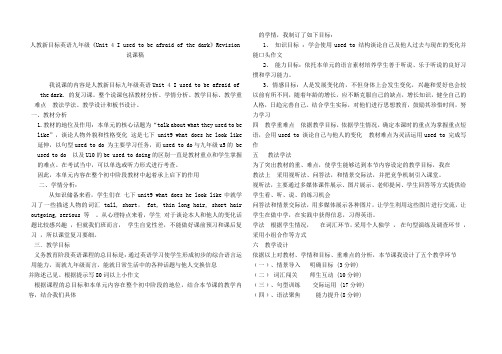
人教新目标英语九年级《Unit 4 I used to be afraid of the dark》Revision说课稿我说课的内容是人教新目标九年级英语Unit 4 I used to be afraid of the dark. 的复习课。
整个说课包括教材分析、学情分析、教学目标、教学重难点教法学法、教学设计和板书设计。
一、教材分析1.教材的地位及作用:本单元的核心话题为“talk about what they used to belike”,谈论人物外貌和性格变化这是七下unit9 what does he look like 延伸,以句型used to do 为主要学习任务,而used to do与九年级u5的 be used to do 以及U10的be used to doing的区别一直是教材重点和学生掌握的难点。
在考试当中,可以单选或听力形式进行考查。
因此,本单元内容在整个初中阶段教材中起着承上启下的作用二、学情分析:从知识储备来看,学生们在七下unit9 what does he look like中就学习了一些描述人物的词汇 tall, short, fat, thin long hair, short hair outgoing, serious 等。
从心理特点来看,学生对于谈论本人和他人的变化话题比较感兴趣,但就我们班而言,学生自觉性差,不能做好课前预习和课后复习,所以课堂复习要细。
三.教学目标义务教育阶段英语课程的总目标是:通过英语学习使学生形成初步的综合语言运用能力,而就九年级而言,能就日常生活中的各种话题与他人交换信息并陈述己见。
根据提示写80词以上小作文根据课程的总目标和本单元内容在整个初中阶段的地位,结合本节课的教学内容,结合我们具体的学情,我制订了如下目标:1、知识目标:学会使用used to 结构谈论自己及他人过去与现在的变化并能口头作文2、能力目标:依托本单元的语言素材培养学生善于听说、乐于听说的良好习惯和学习能力。
2021-2022学年人教版英语九年级全一册Revision for Unit4课件
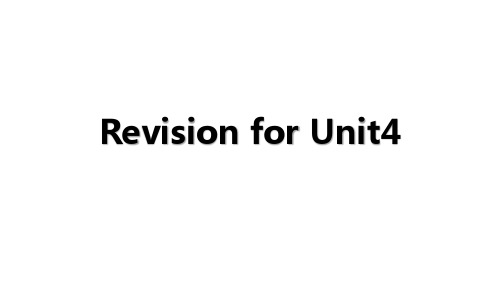
Exercise.
1. I don’t know how to ___C___ the old books? A. hang out B. give up C. deal with D. take up
2. Mr. Liu __B___ watches TV. He thinks watching TV is a waste of time
10. in public
公开的;在别人(尤其是生
人)面前
11. be absent from 缺席
12. take care of
照顾;照料
13. in person
亲身;亲自
14. take pride in
为... 感到自豪
15. be proud of
为...骄傲;感到自豪
16. be worried about 担心
4. —Can you tell me _A___ to London? —Sure. Next month. A. when you will travel B. when will you travel C. when you travelled D. when did you travel
Self check
1. Fill in the blanks with the correct forms of the words in the box.
silent require absent fail interview take pride in be proud of in person influence humorous seldom
亲爱的读者: 春去春又回,新桃换旧符。在那桃花盛开的地方,在这醉人芬芳的季节,愿你生活像春天一 样阳光,心情像桃花一样美丽,感谢你的阅读。
Revision of unit 4课件2022-2023学年人教版九年级全册英语
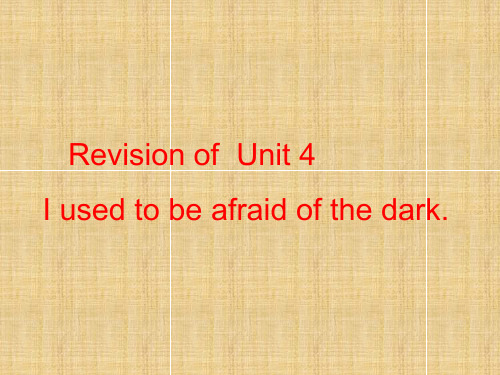
擅长于
3.have difficulties
有困难
4.seldom =hardly
几乎不
5.cause problems
惹麻烦
6.move to the city
搬到城市
7.take care of =look after
照看;照顾
take care = be careful=look out 小心
Ⅲ.按要求完成下列句子,每空一词。 11. My brother used to play football after school.(改为一 般疑问句并作否定回答)
—___D__i_d__ your brother __u_s_e____ __t_o_____ __p_l_a_y___ football
一般疑问句
Did you use to wear glasses ?
4. They used to dislike math .
反义疑问句
They used to dislike math ,didn’t they?
5. Mr Smith used to sleep in his office . 划线提问
after school?
—No,he __d__id__n_'_t.
12. Tom used to be a quiet boy.(改为否定句)
Tom _d__id__n_'_t_ ___u_s_e___ ___t_o____ __b_e_____ a quiet boy.
13. There used to be an old hospital behind our school,
Europe-European Africa-African Britain-British
新2024秋季人教版九年级英语全一册Unit4usedtobeafraidofthedark.
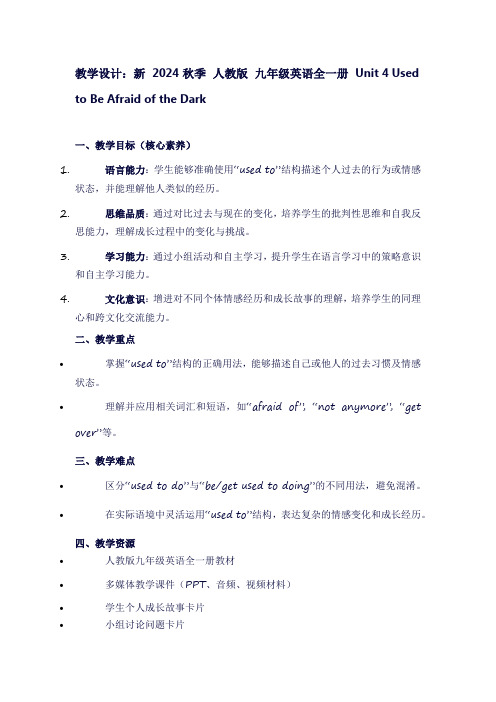
教学设计:新2024秋季人教版九年级英语全一册Unit 4 Used to Be Afraid of the Dark一、教学目标(核心素养)1.语言能力:学生能够准确使用“used to”结构描述个人过去的行为或情感状态,并能理解他人类似的经历。
2.思维品质:通过对比过去与现在的变化,培养学生的批判性思维和自我反思能力,理解成长过程中的变化与挑战。
3.学习能力:通过小组活动和自主学习,提升学生在语言学习中的策略意识和自主学习能力。
4.文化意识:增进对不同个体情感经历和成长故事的理解,培养学生的同理心和跨文化交流能力。
二、教学重点•掌握“used to”结构的正确用法,能够描述自己或他人的过去习惯及情感状态。
•理解并应用相关词汇和短语,如“afraid of”, “not anymore”, “get over”等。
三、教学难点•区分“used to do”与“be/get used to doing”的不同用法,避免混淆。
•在实际语境中灵活运用“used to”结构,表达复杂的情感变化和成长经历。
四、教学资源•人教版九年级英语全一册教材•多媒体教学课件(PPT、音频、视频材料)•学生个人成长故事卡片•小组讨论问题卡片五、教学方法•情境模拟法:通过创设具体情境,让学生在模拟中学习和运用“used to”结构。
•合作学习法:组织小组讨论,鼓励学生分享个人经历,促进相互学习和交流。
•任务驱动法:设计一系列任务,让学生在完成任务的过程中学习和巩固新知识。
六、教学过程导入新课•故事导入:教师讲述一个简短的关于自己或他人过去害怕某物但最终克服的故事,引导学生思考自己是否有类似的经历。
•引入主题:通过提问“What were you afraid of when you were younger?”引导学生进入“used to be afraid of”的话题讨论。
新课教学1.词汇预热(1a)•展示与“害怕”相关的图片,引导学生说出对应的英文单词,如“dark”, “spiders”, “heights”等。
九年级英语人教版全册 Unit4_Changing_补充阅读
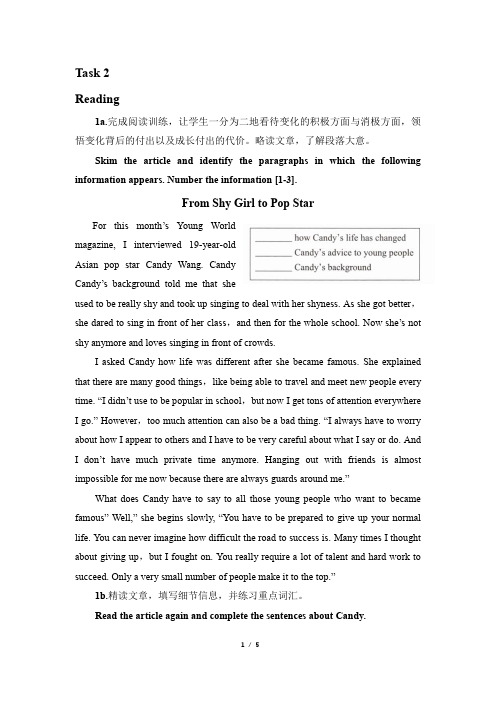
Task 2Reading1a.完成阅读训练,让学生一分为二地看待变化的积极方面与消极方面,领悟变化背后的付出以及成长付出的代价。
略读文章,了解段落大意。
Skim the article and identify the paragraphs in which the following information appears. Number the information [1-3].From Shy Girl to Pop StarFor this month’s Young Worldmagazine, I interviewed 19-year-oldAsian pop star Candy Wang. CandyCandy’s background told me that sheused to be really shy and took up singing to deal with her shyness. As she got better,she dared to sing in front of her class,and then for the whole school. Now she’s not shy anymore and loves singing in front of crowds.I asked Candy how life was different after she became famous. She explained that there are many good things,like being able to travel and meet new people every time. “I didn’t use to be popular in school,but now I get tons of attention everywhere I go.” However,too much attention can also be a bad thing. “I always have to worry about how I appear to others and I have to be very careful about what I say or do. And I don’t have much private time anymore. Hanging out with friends is almost impossible for me now because there are always guards around me.”What does Candy have to say to all those young people who want to became famous” Well,” she begins slowly, “You have to be prepared to give up your normal life. You can never imagine how difficult the road to success is. Many times I thought about giving up,but I fought on. You really require a lot of talent and hard work to succeed. Only a very small number of people make it to the top.”1b.精读文章,填写细节信息,并练习重点词汇。
九年级英语全册Unit4Whatwouldyoudo(第4课时)教案人教新目标版

Unit 4 What would you do?(SectionB1a—2c)Teaching goals:Talk about personalitiesGet the students to grasp the new words:energetic, confident, permission, herself。
Listen, describe and talk about personalities.Talk about embarrassing situations(worries/problems)Get the students to grasp the sentence structure:“What would you do if….?”(目标引领,用一段话表述了本节课的知识、能力和情感目标.)Teaching procedures and ways 教学过程与方式Step 1 PreviewLook at p29, put the following into Chinese or English.1.在公共场所______________________2.变得紧张________________________3.做演讲_______________________4.未经准许_____________________5.be in a movie_____________________6.be friends with sb.________________________7.introduce oneself __________________________8.ask one’s permission _________________________(预习强调学生的参与、体验、感知、实践和交流,以学定教。
)Step2 Revision。
What would you do if….I would… if….Step3 Warming up and new words。
人教版高中英语选修九第四单元课件listening-exercise
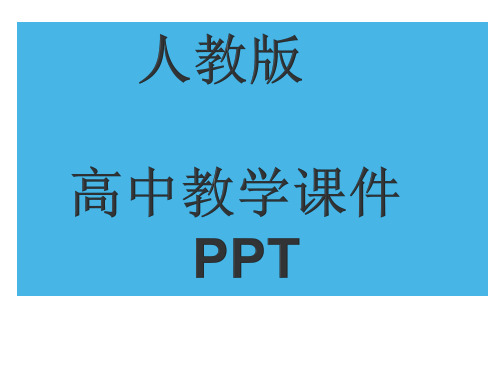
Listen again and fill in the blanks.
TH: Today Mark, Gordon and Andrea are going to tell us about some u__n_u_s_u_a_l plants. Mark, do you want to go first?
Listen again and fill in the blanks. E: Anne, we hear a lot these days about
how _q_u_i_c_k_ly_ tropical rainforests are _d_is_a_p_p_e_a_r_i_n_g_. A: Yes, that's right. Rainforests now _co_v_e_r_ only 6% of the earth's land surface. They used to cover about _1_4_%_, so more than half of the world's tropical rainforests have
A: Me toAon.yw__ay____at_tr, aictts _______ insects that eat dead ainnismtealds obfut ______ ___ getting apifcekedu,p the insects __s_p_rea_d__ its pollen and _______ it to other Rafflesias, Rafflesia arnoldii grows in the jungles in Indocnuet sidaowbnut as the forests are breairneg ____ _____, it’s becoming very _____.
英语人教PEP版九年级(上册)Unit+4+Section+B+1a-1e+(2024版新教材)

1b What other things did you use to like to do when you were a child? Write sentences in the box. Then discuss them with a partner.
schooห้องสมุดไป่ตู้.
Boy We used to __p_l_a_y_ every day after school.
I used to hate _P_._E_.__c_la_s_s_.
Now
I don’t worry about ____t_e_s_ts___. We can wear w__h_a_t_e_v_e_r_w__e__li_k_e_ to
Yes, me too. And I used to ...
Practice 1e Ask and answer
What did you use to like when you were a child?
Did you use to like swimming when you were a child?
______ painting pictures
I used to like painting
pictures.
n. 蚂蚁
_______ music class I used to like music class.
n. 昆虫
________ ants and other insects
I used to like ants and other
insects.
What other things did you use to like to do when you were 1b a child? Write sentences in the box. Then discuss them
+Unit4(Grammar+Focus)+教案2023-2024学年人教版英语九年级全册
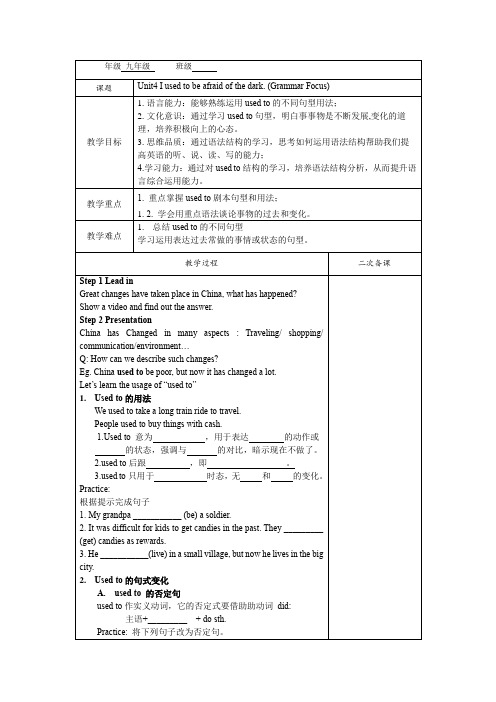
年级九年级班级课题Unit4 I used to be afraid of the dark. (Grammar Focus)教学目标1.语言能力:能够熟练运用used to的不同句型用法;2.文化意识:通过学习used to句型,明白事事物是不断发展,变化的道理,培养积极向上的心态。
3.思维品质:通过语法结构的学习,思考如何运用语法结构帮助我们提高英语的听、说、读、写的能力;4.学习能力:通过对used to结构的学习,培养语法结构分析,从而提升语言综合运用能力。
教学重点1. 重点掌握used to剧本句型和用法;1.2. 学会用重点语法谈论事物的过去和变化。
教学难点1.总结used to的不同句型学习运用表达过去常做的事情或状态的句型。
教学过程二次备课Step 1 Lead inGreat changes have taken place in China, what has happened?Show a video and find out the answer.Step 2 PresentationChina has Changed in many aspects : Traveling/ shopping/ communication/environment…Q: How can we describe such changes?Eg. China used to be poor, but now it has changed a lot.Let’s learn the usage of “used to”ed to的用法We used to take a long train ride to travel.People used to buy things with cash.ed to 意为,用于表达的动作或的状态,强调与的对比,暗示现在不做了。
ed to后跟,即。
ed to只用于时态,无和的变化。
人教版新目标九年级全一册Revision of Unit4课件(共89张PPT)
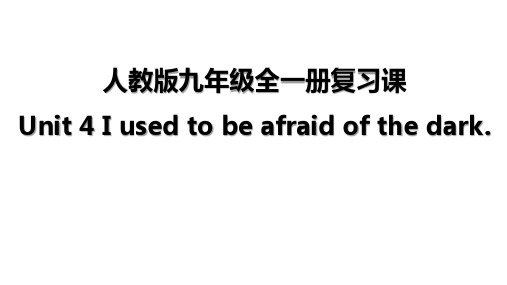
exactly adv. 确切地;精确地 pride n. 自豪;骄傲 proud adj. 自豪的;骄傲的
general adj. 总的;普遍的;常规的 n.将军 introduction n. 介绍
Phrases
10. in front of 在……的前面 辨析:in front of 与 in the front of in front of 在……前面,强调在范围之外的前面。 in the front of 在……的前部,强调在范围之内的前面。
11. whole :形容词,意为“整个的;全部的”。 常用结构:the+ whole +单数名词 辨析:all与whole all用于冠词、所有格或其他限定词之前。 whole用于冠词、所有格及其他限定词之后。
过去常常做某事 害怕 时常;有时 从事;开始 在……前面 能够
used to do sth. be afraid of from time to time take up in front of… be able to
应付;处理 一直;总是 小心;注意 闲逛 不再…… 放弃
deal with all the time be careful about hang out not... anymore give up
2. 与time有关的短语 on time 准时 all the time 总是 at one time 曾经,一度 at no time 绝不
in time 及时 ahead of time 提前 at any time 随时 in no time 立刻;马上
3. score n. 得分;进球
2024九年级人教英语全一册课件精细版Review of Unit 4
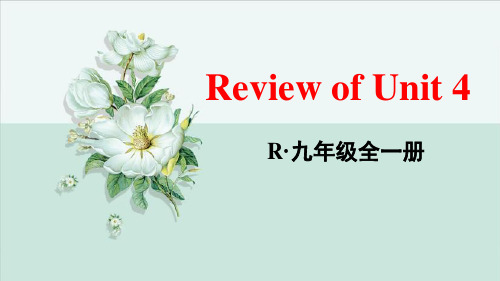
句型结构
①肯定句:主语+used to+动词原形+其他. 例如:我过去常常很晚起床,但现在我每天早 上锻炼。 I used to get up late, but now I exercise every morning.
②否定句:主语+didn’t use to+动词原形+其他. 主语+usedn’t to+动词原形+其他.
准备好做某事 少量的 成功 至少 发表演讲
be prepared to do sth. a small number of make it at least give a speech
公开地;在别人(尤指 生人)面前 担心 一直 在过去 为……骄傲;感到自豪
in public
worry about all the time in the past be proud of
例如:他过去喜欢打篮球吗? 是的,他喜欢。/ 不,他不喜欢。 Did he use to like playing basketball? = Used he to like playing basketball? Yes, he did./ No, he didn’t. = Yes, he used to./ No, he usedn’t to.
5.你知道怎样处理这些旧书吗? Do you know how ___to___ _d__ea_l__ __w_i_th__ these old books?
Grammar 概念
used to 的用法
used to用来表示过去的习惯动作或状态, 暗含现在已不再发生或不存在,意为“过去常 常”,后接动词原形。
拓展
(1)be used to (doing) sth. 习惯于(做)某事 例如:她现在已习惯乘公汽上班。 She is used to taking a bus to work now.
九年级英语人教版Unit4 I used to be afraid of the Revision
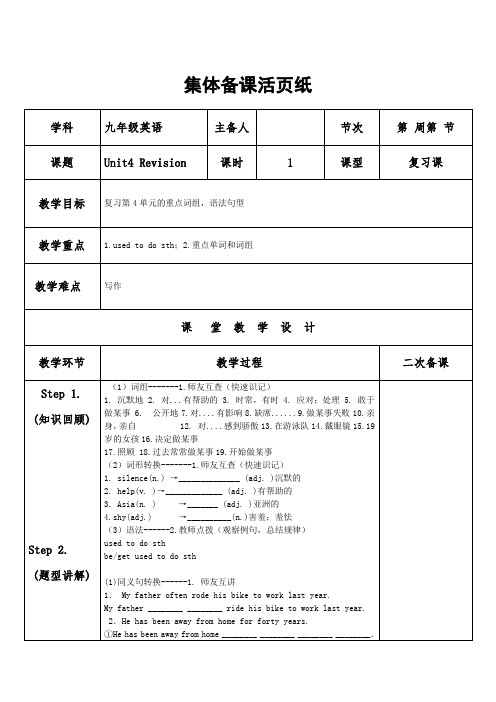
动词应用------1. 师友互讲
Li Wen is a normal 15-year-old boy from the countryside.He works very hard and does well in school. It is hard _________( believe) that he used to _________(have) difficulties in _________(learn).
作业布置
1.复习本单元重点单词,词组和句型
2.作文写作
教学后记
Step 3. (拓展提高)
Step4.
(写作训练)
(1)词组-------1.师友互查(快速识记)
1. 沉默地 2. 对...有帮助的 3. 时常,有时 4. 应对;处理 5. 敢于做某事 6. 公开地7.对....有影响8.缺席......9.做某事失败10.亲身,亲自 12. 对....感到骄傲13.在游泳队14.戴眼镜15.19岁的女孩16.决定做某事
(2)词型转换------1. 师友互讲
1.The clerks are very polite and __________ (help)to the old man.
2.The little girl covered her face with her hand to hide her__________(shy).
17.照顾 18.过去常常做某事19.开始做某事
(2)词形转换-------1.师友互查(快速识记)
1. silence(n.) →______________ (adj. )沉默的
选修九 unit 4 Writing
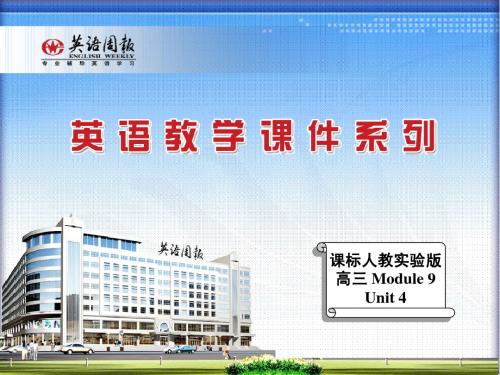
Listen to the second part of the tape again and discuss the question: What was the conclusion of the experiment? Seeds need warmth, water and oxygen to grow.
Four: Take Dish C and put it next to Dish A. Do not water it. Five: Take Dish D and water it with the boiled water. Then drop a small amount of oil onto the cloth and put it next to Dish C. Six: Leave them all for a few days. OK, now you can go ahead and set up the experiment.
boiled water and some cooking oil.
Third listening
Listen to the first part again and
complete the table of conditions that each
dish of seeds was given.
TH: Very goo the experiment in your science notebook.
Writing task
When writing an experiment report, you can ask questions about: ● the position of the headings, what the headings are, their order: ● how the items in the “materials” section are presented (as a list);
部编人教版英语九下Unit9第4课时(SectionB1a-1d)
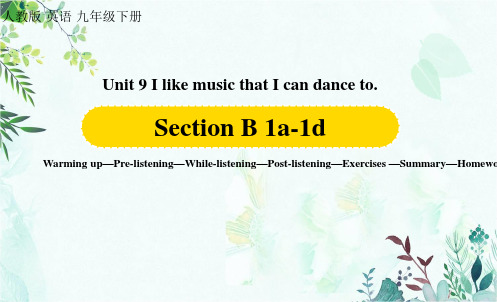
What kind of bands do you prefer?
I prefer bands that play quiet and slow songs/ play different kinds of music.
Pre-listening Pair work
What’s your favorite book/movie/band?
Ali:
Me, too. Say … is that a new book over there?
Michael: Yes, it is. It’s a book about volleyball. It tells you how you
can
be a good player.
Ali:
Is it good?
He likes
clothes
.
He likes
writers
.
He likes
movies
.
While-listening
1c Listen again. Write why Michael likes each thing in the second column of the chart in 1b.
人教版 英语 九年级下册
Unit 9 I like music that I can dance to.
Section B 1a-1d
Warming up—Pre-listening—While-listening—Post-listening—Exercises —Summary—Homewo
Learning goals
What Michael likes
- 1、下载文档前请自行甄别文档内容的完整性,平台不提供额外的编辑、内容补充、找答案等附加服务。
- 2、"仅部分预览"的文档,不可在线预览部分如存在完整性等问题,可反馈申请退款(可完整预览的文档不适用该条件!)。
- 3、如文档侵犯您的权益,请联系客服反馈,我们会尽快为您处理(人工客服工作时间:9:00-18:30)。
4. exotic clothes 奇装异服
5. date back to/from... = have existed sincБайду номын сангаас 自某 时代存在至今
6. This castle dates from the 14th century. 这座城 堡建於14世纪.
become interested in…= be interested in…
take interest in… 以…为乐
feel/have/show/express (an) interest in sb/sth
lose interest in 对…失去兴趣
4. Brave young men took the opportunity of going on botanical expeditions, often facing many dangers including disease, near-starvation, severe environments and conflicts with the local people.
7. Our partnership dates back to 1960. 我们从 1960年就合伙了.
2. However, it was not until the eighteenth and nineteenth centuries that the exploratiion of the botanical world began on a large scale.
enormous adj. very large; immense 巨大的; 极大的
an enormous amount of money 巨款 an enormous house 巨大的房子.
6. One plant explorer lost several year’s work when his plants were ruined with seawater.
take the opportunity of doing sth
= take the opportunity to do sth.
Let me take this opportunity to say a few words. 请让我趁此机会讲几句话. conflict v. / n. 冲突; 抵触; 争执; 争论
ruin vt. 毁坏, 毁灭(某事物[某人])
He ruined his prospects by carelessness. 他因疏忽大意而断送了前途.
The storm ruined the crops. 暴风雨毁坏了庄稼.
7. At that time, there were restrictions on the movement of Europeans and so, in order to travel unnoticed, he developed fluency in Chinese and dressed as a Chinese man, even shaving his head in the Chinese style.
1. Collecting “exotic” plants, as they are called, dates back to the earliest times.
2. exotic adj. = introduced from another country; not native 由外国引进的; 非本地的
restrict vt. put a limit on sb/sth 限制或约束某人 [某事物]
Speed is restricted to 30 mph in towns.
市内车速每小时不得超过30英里.
restriction n. 限制; 约束
unnoticed adj. 未被察觉到; 未被注意到
警方向群众呼吁不要惊慌.
appeal (to) vi. be attractive or interesting (to sb) (对某人)有吸引力; (使某人)感兴趣
The idea of camping has never appealed (to me).
对露营这种想法(我)从来就不感兴趣.
conflict between employers and workers
A and B conflict.
A conflicts with B.
5. Keeping plants alive during long land or sea voyages was an enormous challenge.
8. One of the collectors was Father Farges, who collected 37 seeds from a tree that had appealed to him.
appeal vi. 恳求; 呼吁
The police appealed to the crowd not to panic.
scale n. = relative size, extent, etc 规模; 程度; 范围
on a large scale 大规模地
3. Europe had become interested in scientific discovery and the European middle classes took great interest in collecting new plants.
fluency n. 流利; 通顺; 灵活而准确 She speaks English with great fluency.
她说的英语非常流利. fluent adj. 语言流利的, 文字流畅的 She is a fluent speaker of English. She is fluent in English. fluently adv. 流畅的; 流利的
